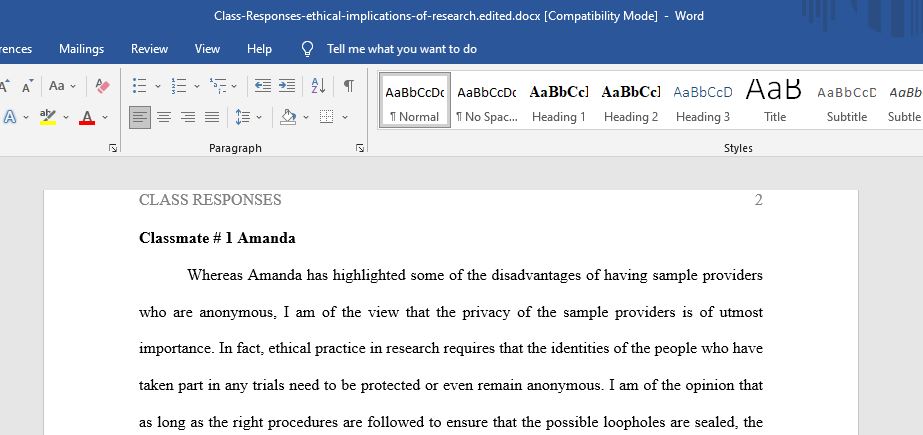Ethical Implications of Research
When responding to your peers’ posts, offer a differing viewpoint, substantiated with your own experience.
Classmate # 1 Amanda
The ethical idea of respect for the patient or sample provider’s privacy has negatively affected the uses of samples along with the ability to share the knowledge gained from those samples. Without being able to adequately follow a sample provider that wishes to remain anonymous, it is impossible to tell if the sample was correct or was an error caused by a single environmental anomaly. In addition to this issue, another dilemma is that without having a sample provider’s identity, it is hard to share information with multiple researcher over distance incase the provider gave more than one sample to these different providers, thus skewing the data collected and then causing incorrect results. “Assuring anonymity makes it difficult to keep track of which sampled respondents have been interviewed, because researchers do not record their names,” (Michael G. Maxfield). Therefore, in criminal justice research if a criminal or inmate is used for a sample group when researching a trend or hypothesis, if they were anonymous, certain factors about the individual could be excluded for privacy reasons to prevent the identification of the subject. While these excluded factors could project the subject, those same factors could lead to a different result or revelation regarding the research whether it be environmental, biological, or psychological. However, this privacy of subjects can protect the subjects from repercussions in participating in the research.
Classmate # 2 Christina
Ethical implications of research are essential in this course because of environmental, cultural, and social influences on an individual and their ethics. I am in a law enforcement field and have conducted research for law enforcement purposes. The standards in which I completed that research were essential in maintaining the ethics of that research. There is the law, and then there is my personal ethics that have been developed over the course of my lifetime. This is something that I personally dealt with when I entered my profession. Murder is legally, morally, and ethically wrong. Yet, I will kill in order to protect the innocent. So can I say that I may excuse an act that I would normally deem unethical in certain situations? Most definitely, and I am not the only one. I was required to take a polygraph for my last professional position, and during this test I was specifically asked, “was this act committed outside of war?” Acts that are considered illegal or unethical will be excused under certain circumstances. So, if one was presented a situation where they had to research a criminal act that they perceived to be justified they may be inclined, subconsciously, to manipulate the information. They could accumulate actual facts, and present them in a way that justifies the act. There is also situation where one might consciously fabricate, falsify, or misrepresent information in order to promote their ideologies. They could also do this in order to minimize error in the information. Ethical implications in research are essential in promoting the objectives of research- knowledge, facts, etc. Another instance where I have personally seen the importance of the ethical implications of research is the necessity of collaborative work that may be required in research practices. There needs to be trust, accountability, respect, etc. If one is known to have wavering ethical standards in this area people are less likely to cooperate. When enough people refuse to cooperate your research becomes harder to complete and you could be forced to use less valuable information which will lower the value of your finished work. From a law enforcement stand point a case can be dismissed for violations of ethical standards in the investigation process. The guilty party goes free and the justice system is a failure for failing to impose penalty on that party who violated the law. Even further, law enforcement officers can lose their jobs or be prosecuted for failing to maintain ethical standards in the investigative process.
Answer preview:
Words: 300

